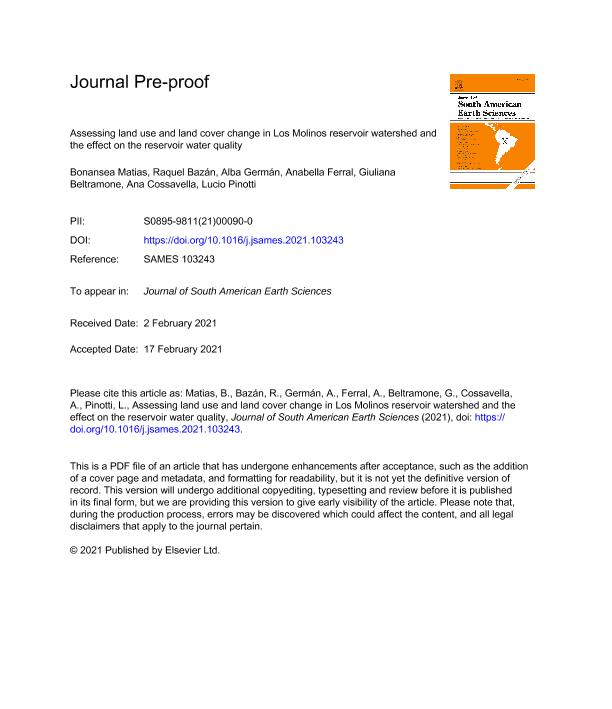Mostrar el registro sencillo del ítem
dc.contributor.author
Bonansea, Matias

dc.contributor.author
Bazán, Raquel del Valle

dc.contributor.author
German, Alba

dc.contributor.author
Ferral, Anabella

dc.contributor.author
Beltramone, Giuliana Beatriz

dc.contributor.author
Cossavella, Ana Maria

dc.contributor.author
Pinotti, Lucio Pedro

dc.date.available
2021-11-05T18:25:27Z
dc.date.issued
2021-06-23
dc.identifier.citation
Bonansea, Matias; Bazán, Raquel del Valle; German, Alba; Ferral, Anabella; Beltramone, Giuliana Beatriz; et al.; Assessing land use and land cover change in Los Molinos reservoir watershed and the effect on the reservoir water quality; Pergamon-Elsevier Science Ltd; Journal of South American Earth Sciences; 108; 23-6-2021; 1-34
dc.identifier.issn
0895-9811
dc.identifier.uri
http://hdl.handle.net/11336/146188
dc.description.abstract
Understanding and modelling land use and land cover (LULC) change have become one of the major subjects of interest for environmental management due to the negative effects that human activities generate on the normal functioning and dynamics of freshwater resources. Remote sensing and geographic information systems (GIS) are essential tools for assessing the drivers that cause LULC change and its relationship with lake and reservoir water quality. The objective of this study was to assess the spatial and temporal dynamics of LULC change in the watershed of Los Molinos reservoir (Argentina), and to investigate its relationship with the reservoir's water quality. Four Landsat imagery was used to analyse the LULC change in the studied watershed and in different buffer zones from 1990 to 2020. Further, the Normalized Difference Vegetation Index (NDVI) derived from a MODIS time-series dataset (2001–2020) was used to explain the effects of LULC change on the status of the reservoir. Results showed that the most significant LULC change started two decades ago and it has intensified during the last ten years. This change is related to the intensification of agriculture activities, and to the increasing conversion into urban areas, mainly on the shores of Los Molinos reservoir. During the period 2010–2020, urbanization located in the 1 km buffer zone defined from the shore of the reservoir increased at an annual rate of 18.02%. The degradation trend of LULC in Los Molinos watershed significantly contributed to the degradation of water quality of the reservoir. This was corroborated by analysing the MODIS NDVI time-series, which showed that since 2014 the NDVI trend-line presented an increasing behaviour and extreme values of NDVI, related to algal blooms, were more frequently observed.
dc.format
application/pdf
dc.language.iso
eng
dc.publisher
Pergamon-Elsevier Science Ltd

dc.rights
info:eu-repo/semantics/openAccess
dc.rights.uri
https://creativecommons.org/licenses/by-nc-sa/2.5/ar/
dc.subject
LANDSAT SATELLITES
dc.subject
LULC CHANGE
dc.subject
MODIS NDVI TIME-SERIES
dc.subject
RESERVOIR
dc.subject
WATERSHED
dc.subject.classification
Otras Ciencias de la Tierra y relacionadas con el Medio Ambiente

dc.subject.classification
Ciencias de la Tierra y relacionadas con el Medio Ambiente

dc.subject.classification
CIENCIAS NATURALES Y EXACTAS

dc.title
Assessing land use and land cover change in Los Molinos reservoir watershed and the effect on the reservoir water quality
dc.type
info:eu-repo/semantics/article
dc.type
info:ar-repo/semantics/artículo
dc.type
info:eu-repo/semantics/publishedVersion
dc.date.updated
2021-07-30T18:05:58Z
dc.journal.volume
108
dc.journal.pagination
1-34
dc.journal.pais
Estados Unidos

dc.description.fil
Fil: Bonansea, Matias. Universidad Nacional de Río Cuarto. Facultad de Ciencias Exactas Fisicoquímicas y Naturales. Instituto de Ciencias de la Tierra, Biodiversidad y Ambiente - Consejo Nacional de Investigaciones Científicas y Técnicas. Centro Científico Tecnológico Conicet - Córdoba. Instituto de Ciencias de la Tierra, Biodiversidad y Ambiente; Argentina. Universidad Nacional de Río Cuarto. Facultad de Agronomía y Veterinaria; Argentina
dc.description.fil
Fil: Bazán, Raquel del Valle. Comisión Nacional de Actividades Espaciales. Instituto de Altos Estudios Espaciales "Mario Gulich"; Argentina
dc.description.fil
Fil: German, Alba. Consejo Nacional de Investigaciones Científicas y Técnicas; Argentina. Comisión Nacional de Actividades Espaciales. Instituto de Altos Estudios Espaciales "Mario Gulich"; Argentina
dc.description.fil
Fil: Ferral, Anabella. Consejo Nacional de Investigaciones Científicas y Técnicas; Argentina. Comisión Nacional de Actividades Espaciales. Instituto de Altos Estudios Espaciales "Mario Gulich"; Argentina
dc.description.fil
Fil: Beltramone, Giuliana Beatriz. Comisión Nacional de Actividades Espaciales. Instituto de Altos Estudios Espaciales "Mario Gulich"; Argentina. Consejo Nacional de Investigaciones Científicas y Técnicas; Argentina
dc.description.fil
Fil: Cossavella, Ana Maria. Universidad Nacional de Córdoba; Argentina
dc.description.fil
Fil: Pinotti, Lucio Pedro. Universidad Nacional de Río Cuarto. Facultad de Ciencias Exactas Fisicoquímicas y Naturales. Instituto de Ciencias de la Tierra, Biodiversidad y Ambiente - Consejo Nacional de Investigaciones Científicas y Técnicas. Centro Científico Tecnológico Conicet - Córdoba. Instituto de Ciencias de la Tierra, Biodiversidad y Ambiente; Argentina
dc.journal.title
Journal of South American Earth Sciences

dc.relation.alternativeid
info:eu-repo/semantics/altIdentifier/url/https://linkinghub.elsevier.com/retrieve/pii/S0895981121000900
dc.relation.alternativeid
info:eu-repo/semantics/altIdentifier/doi/https://doi.org/10.1016/j.jsames.2021.103243
Archivos asociados
